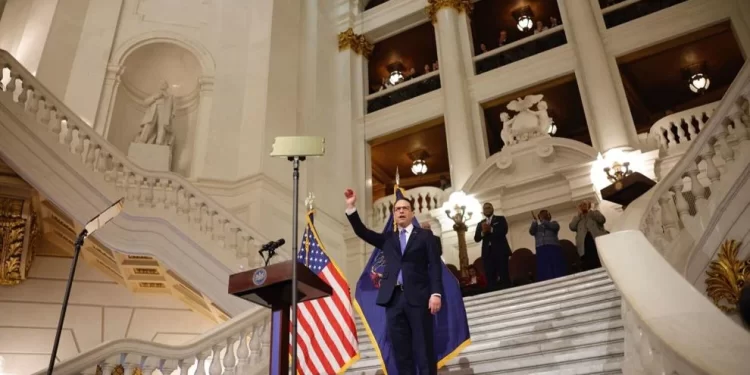By Anthony Hennen | The Center Square
(The Center Square) — Pennsylvania Gov. Josh Shapiro’s second budget address again touted major spending for education, a statewide economic investment plan and significant funding for public transit.
All of this, he argued, could be done with a balanced budget and no new taxes, along with a minimum wage increase, a new gun violence office and the legalization of recreational marijuana.
And, perhaps most importantly, could undermine Ohio’s economic prowess just a little bit.
“Over the last five years, our neighbors Ohio, New York, and New Jersey all committed more resources to economic development than Pennsylvania,” Shapiro said. “Their investment is paying off. And I’m sick and tired of losing to friggin’ Ohio!”
For K-12 education, Shapiro called for $1.1 billion in new funding, with all schools to get no less than the previous year, including a $50 million increase for special education and $30 million for pre-K programs to recruit and retain teachers, as well as money for student mental health.
Buildings, too, could get a boost, as the governor proposed a $1.5 billion fund, with $300 million this year, to invest in physical upgrades “to help these districts maintain safe and healthy learning environments for students.”
“Real opportunity begins in our classrooms,” he said.
Shapiro is also touting a higher education reform plan that would combine PASSHE and community colleges into one system, institute performance-based funding for state-relateds, and dedicate $279 million to offset student costs.
“Under my plan, no student or family making the median income or below will have to pay more than $1,000 per semester for tuition and fees in this new system,” Shapiro said.
Providing more details on his economic development strategy, he proposed a $500 million bond to prepare site for development to attract companies to Pennsylvania
“These sites and our investments in innovation are key to growing our economy, rebuilding our communities, and combating climate change,” Shapiro said.
From climate change, he pivoted to a proposed $1.5 billion over five years for public transit, including $40 million for Pittsburgh Regional Transit and LANTA in Lehigh and Northampton Counties.
“Public transit provides freedom and opportunity,” Shapiro said. “It makes us competitive and helps us sell our commonwealth to others.”
For SEPTA, he’s offering $161 million with an automatic match of 15% from local counties. But to get the funding, Shapiro said he insisted that SEPTA must address cleanliness and safety problems. The transit agency has faced financial troubles, falling ridership and crime concerns since the pandemic.
“If you adopt my proposal, they will not cut service or raise fares, and they’ll have a concrete plan for a cleaner, safer public transit system that creates economic opportunity in southeast Pennsylvania,” Shapiro said.
The governor also called upon the General Assembly to raise the minimum wage in Pennsylvania to $15 an hour and legalize recreational marijuana like neighboring states have done in recent years. He then announced the creation of the Office of Gun Violence Prevention and pushed legislators to pass gun reform legislation.
“You all like to talk a big game about law and order,” Shapiro said. “So let’s strengthen our laws and bring about more order.”
Referencing the state’s $14 billion budget surplus, he argued that the state “can’t afford not to invest right now” given the “real challenges with education and the workforce that will hold us back if we don’t take action.”
“I do not want to take any more from the people of Pennsylvania than we need to. Instead, I want to invest in them,” Shapiro said. “It’s time to solve these pressing problems, to meet this moment responsibly and with bipartisan compromise.”
Senate Republicans, who lead the chamber, scoffed at the governor’s $48.3 billion spending plan that they say offers no explanation for where the money comes from beyond the state’s $6.1 billion emergency savings account, called the Rainy Day Fund.
Senate President Pro Tempore Kim Ward, R-Greensburg, called it “a budget of unicorns and rainbows.”
“Just a little bit for everybody in this budget without telling us how you’re going to pay for it,” she said.
“We will dig into this budget,” Ward added. “We will look at it hard. We will try to find out where he’s coming up for the money to pay for this, instead of just raiding the Rainy Day Fund.”




